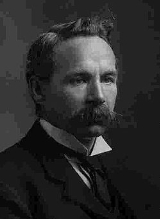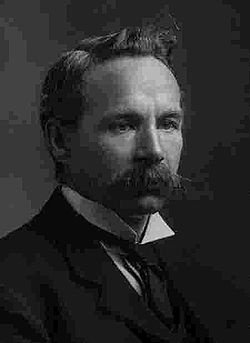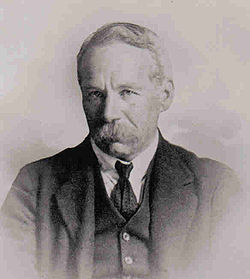
Marcus Seymour Pembrey
Encyclopedia
This article is about the 19th century physiologist, not Marcus Pembrey
, Geneticist.
 Marcus Seymour Pembrey FRS, (1868- 23 July 1934) was a British physiologist who held important posts in several British hospitals and other organisations. He was also the author of several well known medical books. Although he worked primarily as a lecturer in physiology
Marcus Seymour Pembrey FRS, (1868- 23 July 1934) was a British physiologist who held important posts in several British hospitals and other organisations. He was also the author of several well known medical books. Although he worked primarily as a lecturer in physiology
he spent time in the laboratory of Walther Flemming
at Kiel
in Germany
, where pioneer work in cytological technique was going on, and then at Würzburg
where he carried out research under Adolf Eugen Fick
and Eduard von Rindfleisch
. In Oxford
, where he then worked as a demonstrator in physiology, he collaborated with Professor J.S. Haldane in determining the composition of air. He was elected a Fellow of the Royal Society, (FRS) in 1922. Many of his hundreds of old students from Guy's Hospital went on to become eminent physicians, surgeons, clinical chemists, haematologists and gynaecologists of their day. For some 30 years until his retirement in 1933, he was Chairman and Treasurer of the Guy's Hospital
Physiological Debating Society.
, a distinguished Oriental scholar, was reader and textual editor for the Oxford University Press
. From Oxford High School, he gained a science scholarship at Christ Church, Oxford
at the age of 17, and in 1889 he obtained a 1st Class Honours degree in the newly established School of Physiology.
In 1892, he graduated from the University College Hospital in London with an MB in medicine and gained various university honours, including the Johnson and the Rolleston Memorial Prizes. He was also awarded the Radcliffe Travelling Fellowship where he spent some time in Flemming's laboratory at Kiel in Germany, where the pioneer work in cytological technique was still going on and at Wurzburg, Germany where he carried out research under Fick and Rindfleisch.
He returned to Oxford as Demonstrator of Physiology under Burdon-Sanderson, where he collaborated with Professor J.S. Haldane in determining the composition of the air. In 1895, he took up the Lectureship in Physiology at Charing Cross Hospital
in London and gained his MD from Oxford.
He married Elizabeth Cicely Crake in 1895 at Jevington Church, near Eastbourne. She was the eldest daughter of the Reverend Edward Ebeneezer Crake and Elizabeth Tanner of the Old Rectory.
In 1900, he migrated to Guy's Hospital, London as Lecturer in Physiology, jointly with John W. Washbourn and later with Ernest Starling. He succeeded Professor Starling and became sole Lecturer and in 1920, the post was converted into a London University Professorship. He was the author of a number of papers, published mainly in the Journal of Physiology and the Proceedings of the Royal Society
and Guy's Hospital Reports. He was joint author of several well- known medical books. In recognition of his own pioneering experimental work in human physiology, he was elected a Fellow of the Royal Society (FRS) in 1922.
 For many years he was in great demand as a lecturer or as chairman of various debating societies, which had a practical medical interest, such as the Associations of Nurses, Midwives and School Inspectors, Sanitary Institutes and the Royal Army Medical Corps
For many years he was in great demand as a lecturer or as chairman of various debating societies, which had a practical medical interest, such as the Associations of Nurses, Midwives and School Inspectors, Sanitary Institutes and the Royal Army Medical Corps
(RAMC). A provocative raciness and a facility with quip and proverb made him the ideal inciter of controversy and the records of these associations are a mine of his sayings, which Old Guy's Men will at once recognise as 'Pembreyisms'. For example; " Fasting does not make one more spiritual but compels the victim to live upon his own flesh - to become a cannibal" ; " The petty pilfering of orchards by children should be regarded as a sign, not of original sin but of an imperative demand for vitamins" and " The toilet of the human breast is to be condemned as a fad - the infant desires the taste of its mothers milk and skin, not of scented soap, eau de cologne or tannic acid
". These 'Pembreyisms' were all quoted from the record of just one meeting!
Marcus Seymour served with distinction on the War Office
Committee for the Physiological Effects of Food, Training and Clothing on the Soldier and took an active part in experimental marches with the troops.. One of his most famous quotes stated "The human or horse works best when well fed, and feeds best when well worked". He carried out important work as adviser to the Army Medical Service where he recommended that "The short man, in nearly every respect, made a better soldier than his taller comrades". He was also an advocate of early marriages and during a speech in Sheffield during 1923 he stated: "The greatest service a woman can do is marry early - and if I were in America, I should say marry early and often!"
Many of his hundreds of old students from Guy's Hospital went on to become eminent physicians, surgeons, clinical chemists, haematologists and gynaecologists of their day. For some 30 years until his retirement in 1933, he was Chairman and Treasurer of the Guy's Hospital Physiological Debating Society. Apparently, in recognition for his superb influence and brilliant Physiological lecturing skills, he was offered the 'Freedom of the City of London' but modestly declined to accept the great honour due to his dislike of accolades.
Marcus and his artistic wife Cicely brought up ten children, most of whom went on to become either doctors, vets or nurses, as did a number of his grandchildren. He died of a pulmonary embolism aged 66 years.
Marcus Pembrey
This article is about the living geneticist, not physiologist Marcus Seymour PembreyMarcus Pembrey is a clinical geneticist at the Institute of Child Health in London with a particular interest in epigenetics and the possible inheritance of acquired characteristics...
, Geneticist.

Physiology
Physiology is the science of the function of living systems. This includes how organisms, organ systems, organs, cells, and bio-molecules carry out the chemical or physical functions that exist in a living system. The highest honor awarded in physiology is the Nobel Prize in Physiology or...
he spent time in the laboratory of Walther Flemming
Walther Flemming
Walther Flemming was a German biologist and a founder of cytogenetics.He was born in Sachsenberg near Schwerin as the fifth child and only son of the psychiatrist Carl Friedrich Flemming and his second wife, Auguste Winter...
at Kiel
Kiel
Kiel is the capital and most populous city in the northern German state of Schleswig-Holstein, with a population of 238,049 .Kiel is approximately north of Hamburg. Due to its geographic location in the north of Germany, the southeast of the Jutland peninsula, and the southwestern shore of the...
in Germany
Germany
Germany , officially the Federal Republic of Germany , is a federal parliamentary republic in Europe. The country consists of 16 states while the capital and largest city is Berlin. Germany covers an area of 357,021 km2 and has a largely temperate seasonal climate...
, where pioneer work in cytological technique was going on, and then at Würzburg
University of Würzburg
The University of Würzburg is a university in Würzburg, Germany, founded in 1402. The university is a member of the distinguished Coimbra Group.-Name:...
where he carried out research under Adolf Eugen Fick
Adolf Eugen Fick
Adolf Eugen Fick was a German physiologist. He started to study mathematics and physics, but then realized he was more interested in medicine. He earned his doctorate in medicine at Marburg in 1851...
and Eduard von Rindfleisch
Eduard von Rindfleisch
Georg Eduard von Rindfleisch was a German pathologist who was a native of Köthen . He studied medicine in Würzburg and Berlin, earning his doctorate in 1859. After attaining his degree he was an assistant to Rudolf Virchow, and later practiced medicine in Breslau, Zurich and Bonn...
. In Oxford
Oxford
The city of Oxford is the county town of Oxfordshire, England. The city, made prominent by its medieval university, has a population of just under 165,000, with 153,900 living within the district boundary. It lies about 50 miles north-west of London. The rivers Cherwell and Thames run through...
, where he then worked as a demonstrator in physiology, he collaborated with Professor J.S. Haldane in determining the composition of air. He was elected a Fellow of the Royal Society, (FRS) in 1922. Many of his hundreds of old students from Guy's Hospital went on to become eminent physicians, surgeons, clinical chemists, haematologists and gynaecologists of their day. For some 30 years until his retirement in 1933, he was Chairman and Treasurer of the Guy's Hospital
Guy's Hospital
Guy's Hospital is a large NHS hospital in the borough of Southwark in south east London, England. It is administratively a part of Guy's and St Thomas' NHS Foundation Trust. It is a large teaching hospital and is home to the King's College London School of Medicine...
Physiological Debating Society.
Biography
Marcus Seymour Pembrey was born in 1868 at 164 Walton Street, Oxford where his father John Cripps Pembrey JnrJohn Cripps Pembrey Jnr
John Cripps Pembrey Jnr was a distinguished Oriental proof reader. He was apprentice to Thomas Combe and worked with his father John Cripps Pembrey Snr at Oxford University Press, setting up Sanskrit in type for publication, in 1849, of the first volumes of the Rig-Veda, one of the first printed...
, a distinguished Oriental scholar, was reader and textual editor for the Oxford University Press
Oxford University Press
Oxford University Press is the largest university press in the world. It is a department of the University of Oxford and is governed by a group of 15 academics appointed by the Vice-Chancellor known as the Delegates of the Press. They are headed by the Secretary to the Delegates, who serves as...
. From Oxford High School, he gained a science scholarship at Christ Church, Oxford
Christ Church, Oxford
Christ Church or house of Christ, and thus sometimes known as The House), is one of the largest constituent colleges of the University of Oxford in England...
at the age of 17, and in 1889 he obtained a 1st Class Honours degree in the newly established School of Physiology.
In 1892, he graduated from the University College Hospital in London with an MB in medicine and gained various university honours, including the Johnson and the Rolleston Memorial Prizes. He was also awarded the Radcliffe Travelling Fellowship where he spent some time in Flemming's laboratory at Kiel in Germany, where the pioneer work in cytological technique was still going on and at Wurzburg, Germany where he carried out research under Fick and Rindfleisch.
He returned to Oxford as Demonstrator of Physiology under Burdon-Sanderson, where he collaborated with Professor J.S. Haldane in determining the composition of the air. In 1895, he took up the Lectureship in Physiology at Charing Cross Hospital
Charing Cross Hospital
Charing Cross Hospital is a general, acute hospital located in London, United Kingdom and established in 1818. It is located several miles to the west of the city centre in the London Borough of Hammersmith and Fulham....
in London and gained his MD from Oxford.
He married Elizabeth Cicely Crake in 1895 at Jevington Church, near Eastbourne. She was the eldest daughter of the Reverend Edward Ebeneezer Crake and Elizabeth Tanner of the Old Rectory.
In 1900, he migrated to Guy's Hospital, London as Lecturer in Physiology, jointly with John W. Washbourn and later with Ernest Starling. He succeeded Professor Starling and became sole Lecturer and in 1920, the post was converted into a London University Professorship. He was the author of a number of papers, published mainly in the Journal of Physiology and the Proceedings of the Royal Society
Proceedings of the Royal Society
Proceedings of the Royal Society is the parent title of two scientific journals published by the Royal Society, whereas its initial journal, Philosophical Transactions, is now devoted to special thematic issues...
and Guy's Hospital Reports. He was joint author of several well- known medical books. In recognition of his own pioneering experimental work in human physiology, he was elected a Fellow of the Royal Society (FRS) in 1922.

Royal Army Medical Corps
The Royal Army Medical Corps is a specialist corps in the British Army which provides medical services to all British Army personnel and their families in war and in peace...
(RAMC). A provocative raciness and a facility with quip and proverb made him the ideal inciter of controversy and the records of these associations are a mine of his sayings, which Old Guy's Men will at once recognise as 'Pembreyisms'. For example; " Fasting does not make one more spiritual but compels the victim to live upon his own flesh - to become a cannibal" ; " The petty pilfering of orchards by children should be regarded as a sign, not of original sin but of an imperative demand for vitamins" and " The toilet of the human breast is to be condemned as a fad - the infant desires the taste of its mothers milk and skin, not of scented soap, eau de cologne or tannic acid
Tannic acid
Tannic acid is a specific commercial form of tannin, a type of polyphenol. Its weak acidity is due to the numerous phenol groups in the structure...
". These 'Pembreyisms' were all quoted from the record of just one meeting!
Marcus Seymour served with distinction on the War Office
War Office
The War Office was a department of the British Government, responsible for the administration of the British Army between the 17th century and 1964, when its functions were transferred to the Ministry of Defence...
Committee for the Physiological Effects of Food, Training and Clothing on the Soldier and took an active part in experimental marches with the troops.. One of his most famous quotes stated "The human or horse works best when well fed, and feeds best when well worked". He carried out important work as adviser to the Army Medical Service where he recommended that "The short man, in nearly every respect, made a better soldier than his taller comrades". He was also an advocate of early marriages and during a speech in Sheffield during 1923 he stated: "The greatest service a woman can do is marry early - and if I were in America, I should say marry early and often!"
Many of his hundreds of old students from Guy's Hospital went on to become eminent physicians, surgeons, clinical chemists, haematologists and gynaecologists of their day. For some 30 years until his retirement in 1933, he was Chairman and Treasurer of the Guy's Hospital Physiological Debating Society. Apparently, in recognition for his superb influence and brilliant Physiological lecturing skills, he was offered the 'Freedom of the City of London' but modestly declined to accept the great honour due to his dislike of accolades.
Marcus and his artistic wife Cicely brought up ten children, most of whom went on to become either doctors, vets or nurses, as did a number of his grandchildren. He died of a pulmonary embolism aged 66 years.
Works
- Textbook of General Pathology http://www.archive.org/search.php?query=creator%3A%22Pembrey%2C%20M.%20S.%20(Marcus%20Seymour)%2C%201868-1934%22

